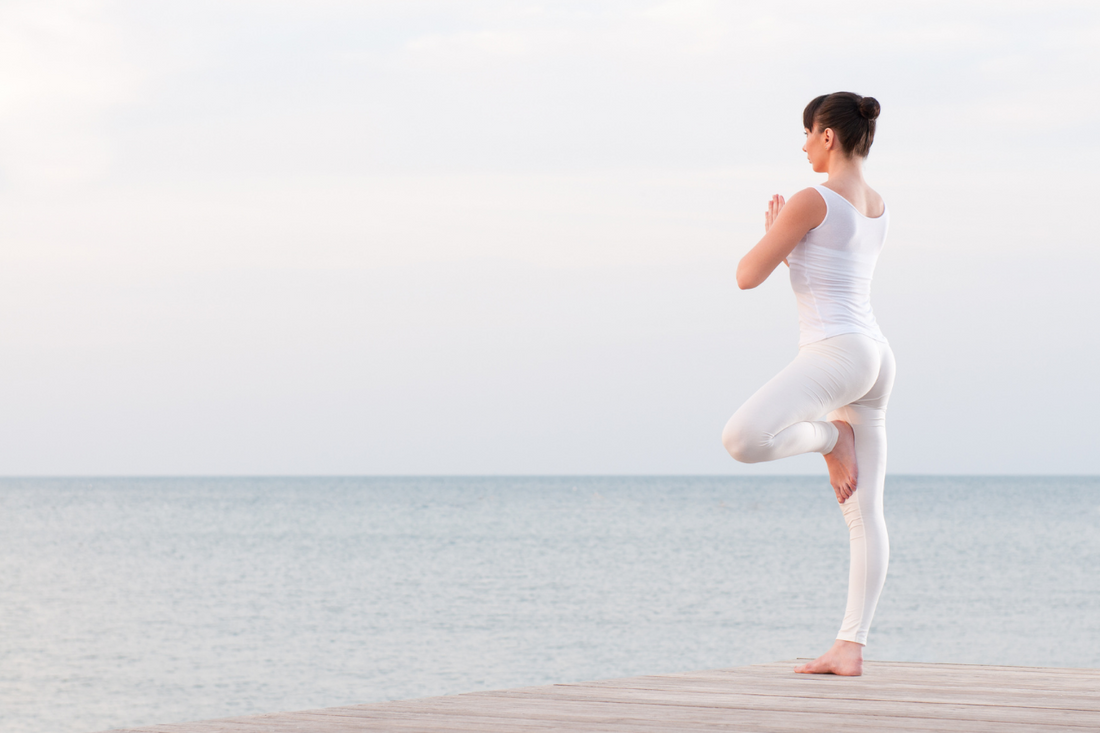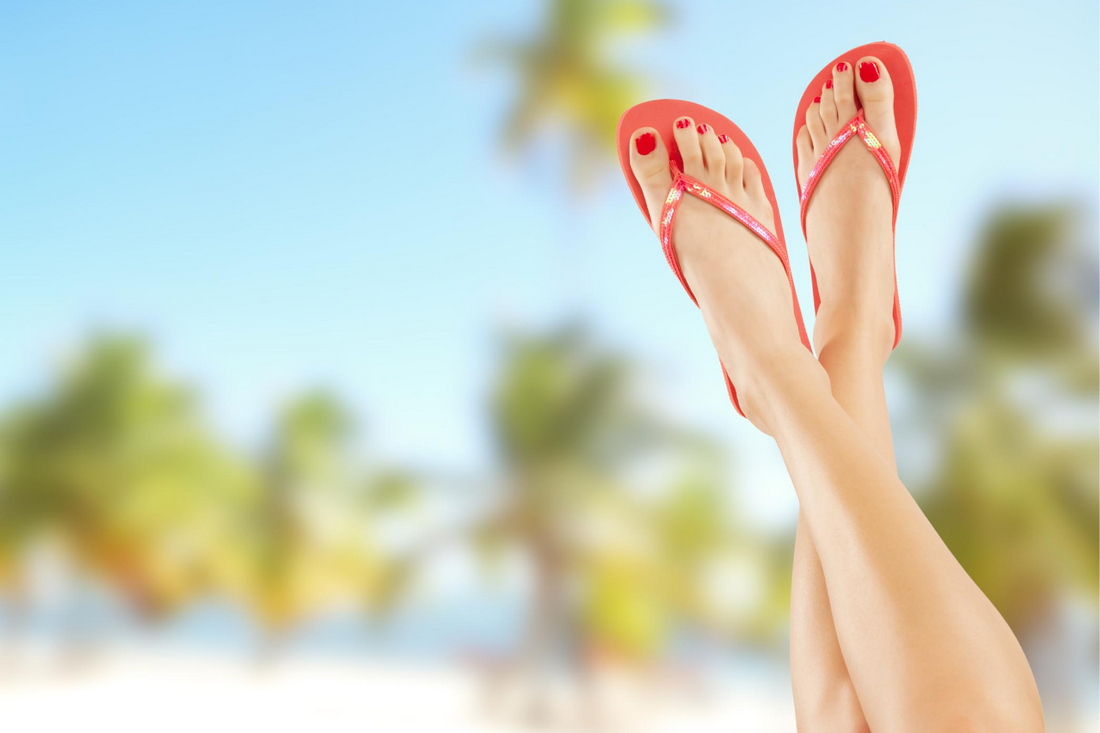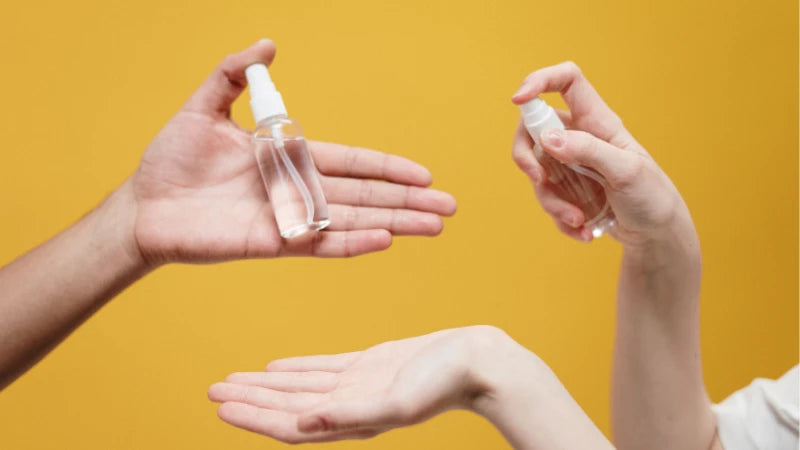Blog
7 Reasons Why You've Got Dull Skin. Let's Get Your Glow Back
If you have dull skin, you need to know that all is not lost. Dull skin is fixable! In this post, we’re diving into why your skin is dull and sharing tips on how to get your radiant glow back. Vitamin C Matters! Vitamin C is one of the ingredients most well known to help revive dull skin into radiant, glowing skin. It is found in our skin’s outermost layers (epidermis and dermis) but it depletes as we get older. Sun damage and pollution can accelerate this decline, leading to skin that looks and feels dull, uneven and less firm. Replenish it with our Bespoke Vitamin C Serum, available in two concentrations 10% (for sensitive skin) and 15% (for normal/tolerant skin). Shop Bespoke Vitamin C 15% Shop Bespoke Vitamin C 10% Why Does My Skin Look Dull and Tired? 7 Reasons 1. You’re Drowning In Dead Skin Cells I know, ewww….You may not know it, but we shed millions of skin cells each day. Most of them just stay put at the top of our skin’s surface, acting like a fine layer of dust, leaving us with skin that looks dull and grey. The Fix? Exfoliate. Remove the dead, dry skin cells so that the new ones can shine through. Ingredients like alpha hydroxy acids and vitamin c (l-ascorbic acid) found in our Bespoke Vitamin C Serum, help to dissolve the dead skin cells, leaving you with brighter looking skin. Scrubs work too (manual exfoliation), but it’s easy to apply too much pressure so we recommend sticking with treatments (like serums) that ‘dissolve’ the skin cells instead. 2. Pollution Every time we step outside, we’re exposing our skin to polluted air, which contains dirt and gases like nitrogen dioxide, ozone, carbon monoxide and sulfur dioxide, which are harmful to skin. These can lead to the development of free radicals. Over time, free radicals damage skin, leading to wrinkles and fine lines plus pigmentation. This uneven skin tone and texture, diffuses light and leaving skin looking dull. The Fix? Wash your face every night to remove dirt and makeup, which can damage skin while you sleep. 3. You’re Stressed Out Stress is inevitable for most of us. It has an impact on our overall wellness and also on our skin. Prolonged stress not only makes you more tired over time, it also impacts the levels of the stress hormone cortisol, along with adrenaline. Increased levels of these hormones caus our heart rate to go up, our blood pressure to rise and sugar to accumulate in our bloodstream. Cortisol increases oil production, leading to acne or sensitive skin. Plus, its presence can increase the break down of skin components like collagen and elastin leading to wrinkles, lines and you got it, dull skin. The Fix? Getting stress under control will help, so try to do that as much as you can. When it comes to your skin, focus on gentle cleansing (our Cloud Nine Foaming Cleansing Crème is a great option) along with moisturizers and treatments rich in antioxidants, and other skin nourishing ingredients to help combat the impact of stress. 4. Blame Your Hormones Fluctuating hormone levels, like those we experience through puberty and menopause, can affect our skin’s appearance. Beyond acne and blemishes, menopause leads to a dip in estrogen levels, which can result in skin that’s drier, leaving it looking dull and lackluster. The Fix? Switch to more hydrating moisturizers and and apply them more often if needed. Consider adding in oils like our Antioxidant Face Oil. Also, lifestyle changes can help to help combat the dryness. More in this post. 5. Your Skin is Dehydrated Without enough hydration, dull skin often follows. Moisture helps to plump up skin cells, leaving them looking more radiant. This isn’t about drinking more water, because increased water consumption can’t make it’s way to dry skin. The Fix? Topical treatments that contain both humectants (like glycerin and hyaluronic acid), attract moisture into skin and emollients (like plant oils or fatty alcohols), soften skin, leaving skin looking less dry and dull. If your skin is particularly dry, add in occlusives (like lanolin, oils and butters) to trap in moisture. 6. Choose Your Drinks Carefully Alcohol and caffeine are dehydrating and can lead to skin that is dry and dull. The Fix? Enjoy them in moderation, swapping out for herbal teas, and non-alcoholic or low alcohol alternatives when you can. 7. Skipping out on Sunscreen UV rays are one of the biggest causes of skin damage. Over time, unprotected exposure to the sun’s rays can damage your skin’s protective barrier, leaving skin looking tired, dark and dull. The Fix? This one’s pretty straightforward – wear your sunscreen every day! What Products Are Good for Dull Skin? If the solutions above weren’t enough, consider the following: 1. Add a Serum to Your Routine Serums are often formulated with high concentrations of active ingredients to help brighten, boost hydration and diminish the signs of aging. Vitamin C serums brighten skin tone, while retinoids help to boost collagen production, pushing away old skin cells and allowing fresh, new ones to come to the surface. There are many forms of vitamin C to choose from – all are great antioxidants but have different effects. L-ascorbic acid has the most skin-related research of any form of vitamin C. Other beneficial forms supported by research include tetrahexyldecyl ascorbate, sodium ascorbyl phosphate, ascorbyl palmitate, magnesium ascorbyl phosphate, ascorbyl palmitate and ascorbyl glucoside. 2. Ditch the Aggressive Cleansers Avoid harsh scrubs and drying soaps, which can irritate skin leaving it looking red, tight and flaky. 3. Stick With Lukewarm Water Hot water can strip away natural oils, disrupting the skin’s protective barrier and leaving it open to dryness (hello dullness) and irritation. 4. Consider a Procedure Topical treatments and lifestyle changes can go a long way but sometimes you may need a bit more help from your dermatologist. Check in with one if you need more help.
Learn moreHere's How to Treat Dry Skin as You Get Older
Here’s how to treat dry skin, an inevitable skin change that comes with aging. In this post, learn about ingredients and tips that will lead to softer, smoother and more touchable skin. At Apothekari, our moisturizers are one of the best ways to manage dryness from head to toe. Shop Moisturizers Why Causes Dry Skin As You Get Older? Your skin ages in two main ways: 1. Extrinsic Aging Extrinsic aging is related to the impact of the environment on your skin. This includes exposure to the sun, pollution and smoke, plus diet and lifestyle factors. Stress, sleep, exercise all contribute to extrinsic aging. Together, they can lead to skin thickening, freckles, age spots and some precancerous changes such as actinic keratosis and skin cancers themselves. The sun’s UV rays damages collagen, elastin and other elements that lead to skin that sags, stretches, and loses its ability to snap back after stretching. Mature skin may also become drier, bruise and tear more easily, and take longer to heal. 2. Intrinsic Aging Intrinsic aging is something that we can’t fight against and which occurs as part of the natural aging process: Thinning of the dermal and epidermal skin layers, resulting in a smaller supply of nutrients to the cells A decline in the production of new skin cells and skin supportive fibers (collagen, elastin, etc) A decreased ability to retain moisture A decline in levels of the hormone, estrogen. Estrogen not only stimulates oil glands, which helps keep skin hydrated, it also helps to maintain the skin’s structure. Dryness affects the skin on all of your body. This includes your face, arms and legs, plus parts of your body, you may not have considered, like your vulva and vagina. More Than Lip Service Vulvar and Vaginal Moisturizer offers fast, hormone-relief for when you experience dryness down there. What is the Best Natural Ingredient for Dry Skin? Whether skin is mature or younger, a good moisturizer is key to help treat dry skin. Moisturizers work by either providing hydration, or by helping to prevent its loss, and they contain 3 main classes of ingredients: Humectants: Help to attract moisture to the skin. Glycerin, hyaluronic acid, urea and aloe vera are humectants. Emollients: Smooth and soften skin by helping to repair cracks in the skin barrier. They prevent moisture loss. Butters, oils, esters, lipids, and fatty acids are all considered emollients. Occlusives: Work by forming a protective coating on your skin’s surface, forming a protective barrier that locks moisture in and keeps harmful particles out. They tend to be oily or waxy. Petrolatum, lanolin, beeswax, jojoba oil, and olive oil are examples. Occlusives like oils, can also be emollients. Each class of ingredient provides benefits of its own, and they’re often combined together for the best results. For best results apply them to slightly damp skin to help lock in the moisture. What is the Best Thing for Dry Skin | Top Tips Using moisturizer is an essential step in dry skin management, but there are many lifestyle changes that you can implement to help as well: Introduce Humidity. The drier the air, the drier the skin. It’s a lesson, I re-learn every time I travel to the desert-like climate in Arizona. Consider using a humidifier in the room where you spend the most time, which, for many of us, is the bedroom. Change Up Your Diet. Increasing your intake of foods rich in omega-3 fatty acids has been shown to help improve the skin’s oil production, improve hydration and minimize the signs of aging. Look for them in nuts (walnuts are a rich source), olive oil, avocados and salmon. Watch Your Alcohol Consumption. Ah yes, a glass of red wine on a Friday evening is very appealing. We’re not telling you to give it up completely, but alcohol, along with caffeine, act as diuretics that can lead to dehydration and drier skin. Up the water intake to help counteract the effect if you can. Exfoliate. No matter how much you moisturize, dry skin will stay dry without some light exfoliation. For the face, check out our AHA-Mazing Clean Cleansing Gel and our Bespoke Vitamin C Serum, which hydrates and exfoliates as well. Cleanse Gently. Harsh cleansers can strip away skin’s protective natural oils. Choose one that is gentle—the one we’ve linked to above is gentle, yet also effective. Add In An Oil. If you’re already using a moisturizer and skin is still dry, consider adding in an oil. These help to lock in the moisture delivered by a moisturizing cream or lotion, relieving dryness even further. Our Antioxidant Face Oil is a boon to drier skin on the face while our Lemon Rose Body Oil offers luxurious hydration post shower or bath. Water—but, don’t make it hot! Hot water strips away skin’s protective oils. Switch to lukewarm and stay away from hot water when you shower, bathe or wash.
Learn moreGetting Back to Active Living for 2021
We’re always excited to share information about healthy living and this post is no exception. Just last week we teamed up with Jillian Mariani, the founder and general manager of Niyama Yoga Wellness for our Active Living Giveaway. In this post, Jillian shares her take on self-care, something that we take seriously here at Apothekari. We hope that you find it as informative and inspiring as we do. Getting Back to Active Living for 2021 by Jillian Mariani Whew – how glad are you that 2020 is in the rear-view? I don’t think there was ever a year I was so happy to see the end of! It felt almost euphoric to ring in 2021, with hope and positivity and some awesome intentions for making 2021 a truly fulfilling year. But a few days in, like me, you might be feeling a little less euphoric – we are still living in a pandemic world of course, and depending where you live there are months of winter ahead. Most of us are still working from home, and again depending where you live, fitness and yoga studios may be closed making some of those new year’s intentions harder to implement. And the early enjoyment of the convenience of online exercise classes may have totally worn off and you might be feeling challenged to get some movement in each day. When you’re working up a sweat, you want to feel confident that you’re smelling sweet. Our natural deodorants are made with skin friendly and worry-free ingredients. Banish odor all day long with odor neutralizing enzymes and skin conditioning ingredients. Free from aluminum, parabens & baking soda. Smell Fresh & Feel Clean With Our Natural Deodorants! When you’re working up a sweat, you want to feel confident that you’re smelling sweet. Our natural deodorants are made with skin friendly and worry-free ingredients. Banish odor all day long with odor neutralizing enzymes and skin conditioning ingredients. Free from aluminum, parabens & baking soda. Shop All Apothekari Natural Deodorants 5 Tips For Making Movement Part of Your Self-Care But this year, perhaps more than any other year, making movement part of your self-care routine is absolutely crucial. Both physically and emotionally, daily exercise has all benefits and no drawbacks. Here are my top 5 tips for Making Movement Part of Your Self-care this winter: 1. Commit and Schedule It This is key: make it a daily habit that you commit to, and show up for yourself. Aim for at least 30 minutes of activity and schedule the time in your calendar at least 5 days out of the week and stick to it. It should be like brushing your teeth or eating meals – you do it because your wellness depends on it. If you really don’t feel up to it that day (hey, I believe in self-compassion too!) do something gentle, like taking a 15-minute brisk walk outside in nature, or taking some restorative poses and meditating. We can all fit that in our day, and if you think you don’t have time, try a day without TV or Netflix or Social Media scrolling. 2. Make it Something You Enjoy Doing something you hate just because you feel it’s good for you won’t last, unless you have superhuman levels of determination. Finding a movement practice you enjoy, whether it is a live online yoga or fitness class, a streamed recorded class, a run, a hike or time spent on an elliptical or stationary bike, will make it so much easier to stick to – you may even wake up looking forward to it. This doesn’t mean you have to do the same thing every day, mix it up if you like, variety is the spice after all, and when most days feel like groundhog day, I personally need to inject some variety into my movement. I personally like to alternate vinyasa-style yoga with barre workouts, and I’m incorporating snowshoeing this winter since the ski hills are closed in Ontario, where I live. 3. Support Your Body with the Right Nutrients, Before and After Exercise Don’t get me wrong, I love coffee. Like really love it. I do have to limit to one per day though, and I just can’t do it before I practice yoga or barre or any type of mindful movement. I am very type A and it just makes my brain run all over the map, so I can’t focus on being present and syncing my breath with movement. But I do need a bit of a motivator before a workout. Which is why I created Green Energy, a clean, plant-based, caffeine-free pre-workout that is actually good for you. Packed with superfood ingredients like spinach, beetroot, maca, acai as well as vegan-sourced amino acids to provide energy and stamina without the jitters. Plus it is vegan, paleo, keto and fasting-friendly with zero sugars or calories, and no artificials. And it’s so delicious that the thought of it actually does motivate me to get into my tights and on my mat. And for after, or as an intra-workout if it’s especially sweaty, I use Niyama’s After Practice Replenish & Repair to help replace electrolytes and support muscle and immune recovery, reducing next day soreness. In a delicious light pineapple coconut flavour, it is seriously refreshing and the l-glutamine and vitamin C help with immune function.I’m also a huge fan of plant protein smoothies, and 90% off the time that is my breakfast. I load up my blender with a scoop of Organic Plant Protein, some frozen berries, and a healthy fat source like a tablespoon of MCT oil or nut butter or ground flax seeds, or a bit of avocado, add a cup of water and blend away. 4. Make it Social If you are finding it hard to motivate yourself alone, enlist a friend or family member. Whether it is joining an online class together but apart, or exercising outdoors in a socially distanced way, making it something you do with someone else can make your workout more fulfilling, and harder to skip. Plus it brings some much needed connection into your day. 5. Take Rest Take a rest day each week – if you function better doing exercise every single day and a day off really throws you, then make one day a week really light – just a walk or some low-impact stretches and let your body rest. And ensure you are getting enough sleep – most adults need 7-9 hours of good quality sleep on a regular basis to function optimally. Don’t Beat Yourself Up And if you miss a few days or have a bit of a lapse, don’t beat yourself up. We are living through very difficult times and just showing up some days (or weeks) is really hard. But get back into it as soon as you can – don’t let days turn into weeks and weeks into months. You will 100% feel better if you get your activity in – your stress levels will be reduced, your mental and emotional health improved and you might even emerge from this with a fitter body, that you feel great living in. About Jillian Jillian Mariani is the founder and general manager of Niyama Yoga Wellness. Jillian spent her 20+ year corporate career in the Canadian Natural Health Supplements category, in sales, marketing and product development with some of Canada’s favourite brands of vitamins and supplements. Jillian holds a BA from UofT, a diploma in Nutritional Management from GBC, an MBA from Schulich School of Business, and a YTT-200H from Downward Dog Yoga Centre. She lives in Toronto with her husband and children, and teaches Vinyasa yoga part-time. In addition to yoga, she enjoys cooking, travel, good books, netflix and turmeric lattes, dark chocolate, and beach walks. About Niyama Yoga Wellness Inspired by the practice of yoga, and clean, active, plant-based living, all Niyama products are vegan, non-GMO and made in Canada. Free from gluten, soy and sugar with no artificial colours, flavours, sweeteners or preservatives.
Learn moreThis is How to Show Off Ageless Skin Effortlessly
Ageless skin, skin that’s healthy, radiant and beautiful, is the goal for most of us.
Learn moreIs Organic Skincare Really Better for You?
If you’re paying closer attention to your health these days, you may be curious whether organic skincare is better. In this post, we’re sharing information that we hope you’ll find useful in making that decision. Read on to learn more. Shop All Apothekari Is Organic Skincare Better? It’s difficult to avoid the claims that organic skincare products are better for your skin, but unfortunately, there’s no evidence to support this. In fact, many organic (along with natural, green, etc) ingredients may be bad for your skin, despite claims that the products are safer or better. This isn’t to say that products made with organic or natural ingredients are terrible, because there are many organic ingredients that are great for your skin. However, just because an ingredient is organic, it doesn’t mean it’s good for skin. And just because it’s synthetic, it doesn’t mean it’s bad for your skin. Natural and/or organic ingredients can be harsh, leading to skin irritation and sensitivities that can get worse over time. This isn’t an issue with organic ingredients only – even synthetic ingredients can be problematic. Ingredients like essential oils, fragrances, harsh cleansers and very low pH or high pH ingredients (like baking soda) may cause skin reactions. On the other hand, there’s also a long list of natural and/or organic ingredients like chamomile, shea butter, some plant oils and turmeric that are great for skin. What to Look For If you’re set on using only organic skincare products, then purchase from reputable companies. These are the ones that know what they are doing – they’re experienced with ingredients and how to incorporate them into safe, stable and effective formulations. They won’t make unsupported and absurd claims. And, they won’t try to frighten you about your skincare choices. The regulations around organic skincare aren’t very clear or strict. Sad, but true, it’s possible that an organic skincare product may contain just one or two organic ingredients. The best way to know that you’re getting what you pay for is to look for certification. Criteria vary depending on the certifying body so get to know them. Organic Skincare Certification Programs The European certifications are most stringent and include: Ecocert Cosmos BDIH UK Soil Association Natrue In the USA, organic cosmetics aren’t regulated by the FDA, rather the USDA program. This means that some organic beauty products are regulated, certified and labeled through the USDA and follow the same certification standards and labeling guidelines as organic food. However, some organic beauty products are certified to independent standards with third-party verification of their ingredients and processing methods. Check to be sure. Whether due to blissful denial or because they don’t know the research, lots of cosmetic companies sell products with ingredients that aren’t really organic or that are a problem for skin. Conversely, just because an ingredient isn’t organic doesn’t mean it’s unsafe or a problem for skin. Let’s set the record straight!
Learn more5 of the Most Surprising Ways to Stop Body Odor
If you’re human, you’re going to sweat, but you don’t have to suffer with body odor! Using a deodorant can help and you can also try some lifestyle changes. Here are 5 that may surprise you. Shop All Apothekari Natural Deodorants For EVERYTHING you wanted to know about body odor and natural deodorant, read this post. How Do You Stop Body Odor Naturally? 5 Lifestyle Tips 1. Apply Deodorant at Night Applying deodorant in the morning after we shower or bathe is part of a routine for most of us. But if it’s not doing the trick for you, try applying deodorant in the morning as well as at night. Deodorant works better when applied to dry skin, which is more likely right before you hop into bed. 2. Watch What You Eat Most of us know that strong smelling foods like garlic, curry and onions can lead to body odor. But did you know that these other foods can also have an impact? Cruciferous vegetables like broccoli, cauliflower, cabbage and kale are very high in fiber and sulfur-containing substances, which break down into hydrogen sulfide leading to a rotten egg kind of smell. There’s also some evidence to suggest that individuals who consume a lot of alcohol may be more prone to body odor. This is because alcohol metabolizes into acetaldehyde, which can contribute to greater body odor. Lastly, eating too much red meat (due to its high fat content) may lead to odor as the bacteria on your skin feed on the fatty acids. 3. Shave Your Pits We’re not judging, but if you want to go au naturel, you should be aware that hair can slow the evaporation of sweat, contributing to more bacteria that increases the chance of body odor. Washing or changing your clothing more often can help. 4. Choose Your Fabrics Carefully Natural fibers (linen, silk, cotton, light wool like merino) breathe and minimize sweating. Newer high-tech fibers wick away moisture, helping you to stay dry, leaving bacteria without anything to feed on. You can also try to dress in layers, which helps to soak up the sweat. 5. Ditch the Fabric Softener Fabric softeners may promise sweeter smelling clothing, but they sit on the surface of clothing fibers, preventing air flow and sweat evaporation. This not only prevents air circulation, but also decreases the efficacy of detergent when you wash your clothes resulting in even more smelly clothing! What Not to Do Although you may have read that anti-bacterial soaps and washes are a good idea, they aren’t worth it in the long run. Antibacterial soaps kill bacteria or stop their growth and it’s not healthy at all. Research has shown antibacterial soaps may impact hormone levels and increase the risk of bacterial resistance. Plus, your body needs bacteria to maintain a healthy, balanced environment on your skin. How Do I Stop My Armpits From Smelling? If you’re following good personal hygiene practice and still can’t manage the odor, it may be time to see a doctor. We’ve written about what causes sweat before, but a medical condition may be responsible. Your doctor can help determine if that’s the cause. Hyperhidrosis is excessive sweating, which can be hereditary or caused by a range of factors including stress, nervousness, diabetes, menopause, thyroid issues, etc. Trimethylaminuria (a.k.a. fish odor syndrome), is a metabolic disorder that prevents the body from breaking down a smelly compound called trimethylamine. Prescription treatments including strong antiperspirants, Botox or electromagnetic therapy may be suitable options. Ask your physician. What Medical Condition Causes Body Odor? Here are some medically related reasons that you may experience body odor. Diabetes. Not body odor per se, but fruity smelling breath may be a sign of diabetic ketoacidosis, which occurs when your body is running low on insulin, causing your blood sugar to spike. Because your body can’t break down carbohydrates for energy, it breaks down fatty acids for fuel, which creates a build-up of acidic chemicals called ketones in the blood. One such acid, acetone, causes the fruity smell. If this is you, check in with your doctor ASAP, as the complications can be life threatening. Stinky skin (stronger than normal body odor) could be a sign of skin infections, as a result of the byproducts of bacterial growth. Liver and kidney disease and hyperthyroidism, can lead to excessive sweat and increased BO. Stinky feet may be signs of a fungal infection (like athlete’s foot), especially if you see dry, scaly skin around your toes, redness and blisters.
Learn moreDo You Really Have to Wash Your Face in the Morning?
If you care about your skin, it’s essential that you wash your face at night, and, we’ve written about why that’s important before. Do you need to wash your face in the morning as well? It depends. Learn more in this post. Shop Aha-Mazing Clean Gel Cleanser Shop Cloud Nine Foaming Cleansing Creme How Many Times a Day Should You Wash Your Face? For most of us, a once daily face wash is enough. Nightly cleansing helps to remove dirt and make-up that accumulates on your skin during the day. It also gets rid of oil build-up that can lead to clogged pores. But what about in the morning when all you’ve done is sleep? Whether or not to wash your face in the morning comes down to skin type and preference. Some of us prefer a warm water splash while others enjoy a morning cleanse. If your skin doesn’t feel dry or oily, continue on with what works for you. If you have oily skin, however, a morning face wash may be essential to help clear away excess oil. Can You Wash Your Face Too Much? While once or twice a day is best for most skin types, there are times when you may want to sneak in one more wash. A third wash can be okay if you’ve been sweating a lot or want to remove make-up ahead of an activity like going to the gym. Over washing removes skin’s protective oils and can lead to dryness, irritation or breakouts. Pay attention and cut back if this seems to be the case. Choose the Best Cleanser With so many cleansers to choose from, how do you find the best one for your skin? No matter what type of cleanser you lean towards, the most important thing is to ensure is that it’s gentle, even if you have oily skin. Harsh, soap-based cleansers are alkaline and can disrupt your skin’s pH leading to redness and irritation. Just as importantly, dry skin types should avoid cleansers that may leave a greasy layer on your face. Opt for creamier textures like our Cloud Nine Foaming Cleanser, if you have dry, sensitive skin. Oily or combination skin types do well with exfoliating and/or foaming cleansers like our AHA-Mazing Clean Gel, which is formulated with alpha hydroxy acids to help dissolve oil. Somewhere in the middle? You have the luxury of using what you enjoy and switching things up! Back to you? Morning cleanse – yes or no?
Learn moreHere's How To Protect Skin From Free Radical Damage
Free radical damage isn’t as scary as it sounds! While it can be harmful, there are many ways to protect your skin. Learn how in this post. Shop Bespoke Vitamin C 15% Here’s How a Free Radical Can Damage Skin If you’ve ever cut into an apple and watched it turn brown after awhile, you’ve witnessed oxidation, something that a free radical is responsible for. A similar thing happens in our skin, but over a period of decades instead of minutes. Free radicals, often referred to as Reactive Oxygen Species (ROS), are highly unstable molecules that are missing an electron. In their search for stability (another electron), a free radical steals one from a stable molecule, causing that molecule to become unstable. This leads to a chain reaction, known as a free radical cascade, that creates more free radicals. Eventually, this process causes damage to our cell membranes, proteins and DNA. When it comes to our skin’s structure, components like collagen, elastin and hyaluronic acid are damaged leading to premature skin aging including visible signs like fine lines and wrinkles and dullness. What Causes Free Radicals? Free radicals are caused by everyday biochemical reactions that occur in our body, but thankfully we have control over lots of external factors that trigger and increase their production: UV Light. Moderate sun exposure is good for us – we need it, it produces vitamin D after all. But, overexposure triggers free radicals, which can lead to DNA damage along with photoaging and hyperpigmentation Like sun exposure, pollution can trigger free radicals, ultimately leading to skin damage Smoking isn’t just bad for our overall health. Cigarette smoke contains free radicals cause a range of problems including premature skin aging Excess alcohol, processed food and those high in saturated fats, are some of the worst offenders for triggering free radicals This is the Best Way to Neutralize Free Radical Damage Minimize free radical damage by eating well (up the fruits & veggies, nuts & oily fish – reduce alcohol), minimizing sun exposure, and stopping smoking. And, add in antioxidants! Antioxidants work by donating one of their own electrons to a free radical without becoming unstable, helping to stop the cascade of damage. Vitamins A, C and E are the most well-known, but several others, including, ferulic acid, green tea, astaxanthin, lycopene, etc. also benefit skin. When it comes to antioxidants, the more the merrier. We’ve formulated our Bespoke Vitamin C Serum, to include not only Vitamins C & E, but also ferulic acid, green tea extract along with others. The moisturizing serum base protects skin from damage and restores its youthful and radiant appearance. Have you tried a Vitamin C serum before?
Learn moreThis is How To Exfoliate Body Skin Like the Pros
Exfoliate body skin to show off softer, smoother arms & legs all year round! We’re sharing tips to help you do it just like the pros. Shop All Apothekari Here’s Why You Should Exfoliate Body Skin Exfoliation comes from the Latin, exfoliatus (to strip of leaves). It’s a term used to describe the process of removing dead skin cells, which can leave skin looking and feeling rough and dry. We’ve written about exfoliation before, but in this post, we’re focusing on body skin. While more of it’s on display during the warmer, summer months, this advice is relevant all year long. Exfoliation not only helps to improve the look and feel of your skin, it can also help to minimize and eliminate ingrown hairs and clogged pores. Using a fake tanner? Exfoliate first to ensure a more even application and better results. How to Exfoliate – Just Like a Pro Here’s how to get softer, smoother skin on your body: Use a washcloth, sponge/loofah or bristle brush. These are best used on dry skin and help to rub away excess skin flakes, leaving your skin softer and cleaner than before. Apply a bit of pressure and scrub gently over your skin in small, circular motions starting from the ankles and working your way upwards. Elevate the experience with a body polish! Our skin pampering Bamboo & Lemongrass Foaming Body Polish works best with wet skin dampened first in the shower or bath. Or, you can use it after getting to work on dry skin. The process is the same – whisk away dry skin cells by using small circular motions, working up from your ankles. Take care or avoid sensitive areas like your torso or breasts. End with a rinse to get rid of flaky skin and wash away residual product. Follow with a treatment like our Shea Body Butter or Lemon Rose Body Oil to seal in moisture and help keep skin hydrated. If you’re exfoliating your entire body, pay extra attention to your heels, elbows, and knees. These areas often experience the most dryness and should be given special attention. Grab our Bamboo Lemongrass Foaming Body Polish and aim to exfoliate once or twice a week. Get ready to say hello to silkier skin!
Learn moreSafe Skincare. What You Need to Know
Go down the internet rabbit hole for long enough, and you’ll start to question if safe skincare products exist. Is danger lurking in those pretty bottles sitting on your counter? Thankfully, for the most part, there’s little cause for concern. Many companies (including us!) make safe skincare, and in this post, learn how to choose them. Shop All Apothekari Is The Beauty Industry Regulated? It’s common misconception that skincare products aren’t regulated in countries like the United States and Canada. But, this just isn’t true. In the USA, the Federal Food, Drug and Cosmetics Act, overseen by the Food & Drug Administration (FDA), regulates cosmetics. And in Canada, Health Canada establishes guidelines for safe skincare. If you’re going to sell a product in Canada, it must be registered with Health Canada (ours are). The rules differ amongst countries, but most developed nations, including the European Union, Japan, Australia, and others, have agencies which set rules that cosmetics companies must comply with. How can you protect yourself? Purchase from reputable companies whose products are registered with their country’s agency. Not sure? Ask. Unregistered products are a red flag that should make you reconsider your purchase. Are Skincare Products Harmful? While the ingredients in skincare products are regulated, the words used to market them are, unfortunately, not! Fear marketing is really effective so many companies use it to get you to buy—or not buy—something. Sadly, the beauty space is filled with mistruths that aren’t backed by science. They’re not only misleading, they’re also very confusing for most customers. At Apothekari, your wellness comes first. Our founder is a pharmacist and those values guide us in everything that we do. Scientific research dictates our formulations and we don’t resort to unsubstantiated claims. We stand by our products and operate with honesty and integrity. Fear isn’t something that we use to scare you into buying our products. How Do You Know if a Skin Product Is Safe? In a world filled with lots of noise, who can you trust when it comes to choosing safe skincare products? Like shopping for anything, the key is to be an educated consumer. Beyond looking for products registered with the relevant regulatory body, and being wary of fear marketing, here’s what’s important: Is The Product Preserved? Despite what you may hear, preservatives are not scary! What is scary, are products that aren’t preserved. Preservatives are essential in any product that contains water to protect you from harm that may be caused by bacteria, fungi and mold. You may be concerned about parabens, but many companies are now using alternatives. If the product contains water, AND says it’s preservative-free, then either the formulator is lying (some of the ingredients may contain preservatives and they don’t need to be listed on the label) or even worse, it’s made by someone putting your health at risk. Read more here. Get to Know Your Ingredients. Don’t be scared by chemicals, because whether synthetic or straight from nature, everything is a chemical. A ‘chemical-free’ product would not only be completely ineffective, it would be impossible to find. Good and bad ingredients can be ‘natural’, ‘green’ and ‘clean’ (unregulated marketing terms, which can mean anything), or made in a lab. It doesn’t matter where it comes from – what’s important is whether it’s safe and effective. Who to trust when it comes to ingredient safety? Again – be cautious about organizations who want to scare you. Here’s a good read. Understand What Works for You. We’re all unique so what works for your best friend may not be so great for your skin. Some of us may be fine with fragrances, while some of us may not. Only you know your body. Get used to reading labels so you can decide for yourself. Knowledge is power. Where do you turn for information when it comes to the safety of your skincare products?
Learn moreGluten Skin and Your Health. This is What You Need to Know
A while ago we wrote about ‘Gluten Face’ (yes it’s a thing!) and now, let’s look at the relationship between gluten skin and your health. Learn more below! Shop All Apothekari Is Gluten Really Bad for You? Over the past few years, gluten has taken a real bashing when it comes to your health. A protein found in grains like wheat, rye and barley, it also can turn up in other foods, through cross contamination. (ie, other grains like oats). Know why we love bread so much? Yup, gluten. It gives baked goods their chewy deliciousness. It may taste great, but sadly, eating it may not be so good for some people. Not so serious, is gluten intolerance, which comes with a long range of symptoms when gluten-containing foods are consumed. Far more serious is Celiac Disease, a genetic, autoimmune condition, that occurs in people where eating gluten leads to damage in the small intestine. Nutrients can’t be absorbed properly into the body and long-term health complications follow, including: Iron deficiency anemia Early onset osteoporosis or osteopenia Infertility and miscarriage Lactose intolerance Vitamin and mineral deficiencies Nervous system disorders Gastrointestinal cancers Neurological issues including epileptic seizures, dementia, migraine, etc Gluten Skin Implications You Should Know About Whether you’re gluten intolerant or have Celiac Disease, the symptoms may be the same. And some individuals, especially those with Celiac Disease, may have no symptoms at all: Digestive issues such as gas, abdominal pain, cramping, bloating, constipation or diarrhea. Ongoing low energy levels, “brain fog,” chronic fatigue syndrome or fibromyalgia. Autoimmune disease such as Hashimoto’s thyroiditis, rheumatoid arthritis, ulcerative colitis, lupus, psoriasis, scleroderma or multiple sclerosis. Neurologic symptoms such as dizziness or feeling off balance. Hormone imbalances such as PMS, PCOS, delayed menstruation onset and stunted growth. Migraines and/or frequent headaches. Joint pain, inflammation and swelling, particularly in fingers, knees or hips Gluten skin issues include eczema, rosacea, skin rashes, psoriasis and keratosis pilaris (also known as ‘chicken skin’ on the back of your arms). Avoid Gluten in Skincare? Should you avoid gluten in your skincare products if you’re intolerant or have Celiac Disease? The answer may surprise you. Turns out that applying vs ingesting gluten, are two very different things. According to Dr. Alessio Fasano, Medical Director of the Center for Celiac Research, University of Maryland, “If you have Celiac Disease, then the application of gluten containing products to the skin should not be a problem, unless you have skin lesions that allow gluten to be absorbed systemically in great quantities.” This advice can be carried over to lipstick and lip products, as they are easily ingested. Last, if you have active dermatitis herpetiformis, a skin condition associated with Celiac Disease, or any cuts or open lesion, then use gluten-free skincare products to prevent its absorption. One caveat: If you have skin issues that won’t clear up no matter what you do, cut out gluten containing skincare products to see if it may help. The following Apothekari products don’t contain any gluten: Glow Getter 3, AHA-Mazing Clean Exfoliating Cleanser, Daily Infusion Moisturizer, Natural Deodorants. They are not certified gluten free. Should You Follow A Gluten Free Diet? Following a gluten free diet is essential if you’ve tested positive for Celiac Disease. It’s not the same with gluten intolerance. Consumption doesn’t carry the same long-term health implications, but you’ll likely feel better if you avoid or restrict it in your diet. I’ve heard ‘experts’ suggest that you shouldn’t go gluten free unless you have Celiac Disease because a gluten free diet is expensive and that you’re going to load up on gluten free crackers, cookies and cakes. To which I say, REALLY? I don’t know about you, but if I’m switching up my diet because of my health, it’s highly unlikely I’ll be loading up on Cheetos. In my family, we have two gluten intolerant individuals. And no, IT.IS.NOT.IN.THEIR.HEADS! Following a gluten free diet is essential to their wellbeing and as the primary food shopper and cook in our house, I’ve learned how to prepare nourishing and delicious meals. Focus on foods that are naturally gluten free, which also tend to be great for your overall wellness: Meat, poultry, and eggs Fish and seafood Beans and legumes Fruits and vegetables Grains and starches including, corn, rice, buckwheat, millet, tapioca, oats (ensure not contaminate) Nuts Dairy Potatoes Vinegars and oils Herbs and spices Gluten Skin & Health Resources You know yourself best so if you need to go gluten free for your health, do it. And, don’t let anyone question why. Check in with a trusted healthcare professional if you need guidance. And, visit the many trustworthy resources online. Here are some to get you started: National Celiac Organization. A non-profit organization dedicated to educating and advocating for individuals with celiac disease and non-celiac gluten sensitivities, Celiac Disease Foundation. (CDF) is a nonprofit that helps fund research, education, and advocacy programs. Learn more about celiac disease and how to live gluten free. NIH. National Institutes of Health link to help you start on your GF journey US FDA. Information to help you read food labels. Gluten Intolearnce Group. Information for individuals with a gluten sensitivity. The Inspired RD. Alysa Bajenaru, a Registered Dietitian’s blog on navigating Celiac Disease. Great recipe inspiration.
Learn moreStress, Skin. What You Need to Know
It’s not just our emotional state that’s affected, when it comes to stress, skin suffers too. In this post learn how to recognize the impact of stress on your skin. Plus, some tips and skincare products to help manage it. Shop Cloud Nine Foaming Cleansing Creme Shop Daily Infusion Moisturizer Shop Antioxidant Face Oil What Stress Does Whether related to our jobs, our relationships or our finances, stress is part of modern-day life. And, it’s not necessarily bad. Good stress, like the kind involved with planning a party, a trip or getting a new job that we love, usually lasts for a short time and makes us feel alive, happy and excited. Other stress, what we often call bad stress, tends to be ongoing. It’s what happens when we’re faced with things like financial stress, a relationship breakup or the uncertainty that we’re all facing due to Covid-19, right now. This kind of stress can damage our health. When we’re under stress, our bodies trigger the release of hormones like cortisol and adrenaline into our systems. These ‘chemical messengers’ lead to bodily responses including an increased heart rate, higher blood pressure and more sugar in the bloodstream. Not so bad if we experience it for just a short time, but when we’re under stress for a long period, the mental and physical impact can be harmful to our well-being. Stress, Skin Changes Beyond the changes described above, cortisol’s release also affects our skin. Oil and sebum production increase, which can result in acne or increased skin sensitivity. Cortisol may weaken the skin’s immune system and increase the breaking down and failing to repair tissues. A decrease in collagen and elastin leads to wrinkles, lines and dull looking skin. If that wasn’t enough, cortisol amps up inflammation, causing flare-ups in conditions like eczema, rosacea and psoriasis. During periods of stress, revisit your skin care routine. Put aside the harsh treatments – like stripping cleansers and exfoliants, and focus on being gentle. Try switching to a gentle cleanser, like our Cloud Nine Foaming Cleansing Crème rich in antioxidant and anti-inflammatory ingredients. In addition to cleaning, it also moisturizes and protects skin. Continue to apply sunscreen daily to defend against UV ray damage and keep skin moisturized if it is dry. Our Daily Infusion Moisturizer hydrates without greasiness and is perfect for all skin types. For a bit of a hydration boost, add in an oil, which helps to soften skin and lock in moisture. Our Antioxidant Face Oil contains fatty acids, antioxidants and skin soothing bisabolol, to help reduce inflammation. Stress Management 101 This time will pass, but it may take a while for us to get there. In the meantime, try to manage stress with a few moments of self-care: Get enough sleep, between 7 and 9 hours for most people Exercise three or four times a week – walking and yoga are fantastic! Consider meditation or deep breathing exercises Relax with a book or connect with a friend Focus on eating a healthy diet, but don’t beat yourself up if you make a slip. We have enough to worry about already! There isn’t one single method that works for everyone, but try a few different things and you’ll find what works for you. Do you have any stress management tips to share?
Learn more












